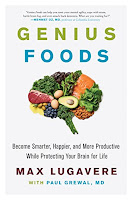Neuro Note 1 OT 537
I have started a new routine. I decided to wake up every morning no later that 8:00 a.m. and watch the morning news. This morning (7/15/19), I was watching the Today show and considering what topic I would cover for my first Neuro Note when low and behold Seth Rogan is on my TV screen talking about Alzheimer's disease.
 |
| Link to Hilarity for Charity Image from: google images |
The segment was about millennials and prevention of diseases that effect the brain, specifically Alzheimer's disease. In 2012 Seth Rogan and his wife started a foundation titled "Hilarity for Charity" which centers on research for degenerative brain disease, awareness for individuals in their 20s and 30s to prevent brain disease, and destigmatizing ideas surrounding brain disease. The segment also interviewed three millennial who advocate for Alzheimer's awareness and prevention. One being a published author that I will touch on later.
I did some further research into the website and I was immediately prompted to sign up for information with boxes like caregiver resources, events, advocacy, brain healthy tips and Alz news. Following this I clicked the tab "This is Alzheimer's" where there are facts and personal stories about the disease. Some facts listed are as follows:
- 5 million Americans are living with Alzheimer's disease.
- Alzheimer's is the 6th leading cause of death in the US.
- Alzheimer’s is the only cause of death among the top 10 in America without a way to prevent, cure, or even slow its progression.
I took the time to read 3 of the 20 plus stories written on the website. The personal testimonies and information provided was raw and eye-opening. One quote from the stories I read jumped out to me:
"Jo was finally diagnosed when he was 37, he’s now 42 and in the later stages of the disease. And also that Alzheimer’s affects all parts of the body as the brain is continually and irreversibly damaged; it isn’t just about forgetting – if only it were that simple."
 |
| Link to buy Genius Foods Image from: Amazon |
 |
| Andres Lozano, TEDtalk TEDtalk on Deep Brain Stimulation Image from: google images |
One final point I would like to make is from a TEDtalk I watched. This TEDtalk was filmed in 2013 and focused on Parkinson's Disease and deep brain simulation however it the final 5 minutes the talk touched on Alzheimer's and its correlation to deep brain simulation. The talk discussed using deep brain simulation to increase glucose level in the brain to "turn the lights back on". I would love to see some of the neurological aspects of Alzheimer's Disease integrated in the millennial discussion. Maybe I will write in to Seth about glucose levels and deep brain stimulation to get the word out there.
Reference
Hilarity for Charity. (n.d.). Retrieved from https://hilarityforcharity.org/
Lozano, A. (n.d.). Retrieved July 15, 2019, from https://www.ted.com/talks/andres_lozano_parkinson_s_depression_and_the_switch_that_might_turn_them_off#t-800364
Samadi, M., Moradi, S., Moradinazar, M., Mostafai, R., & Pasdar, Y. (2019). Dietary pattern in relation to the risk of Alzheimer’s disease: A systematic review. Neurological Sciences. doi:10.1007/s10072-019-03976-3
TodayShow. (n.d.). Retrieved July 15, 2019, from https://www.today.com/video/getting-ahead-of-alzheimer-s-young-people-look-to-protect-brain-health-63867973518
